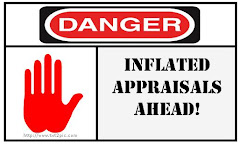There is plenty of opportunity to make money investing in real estate today, legally. I'll never understand why people spend so much time and energy developing scams and schemes when they can just follow the rules and make an honest living. Here's a article about a guy who gets to live in the "Big House" for a while, and I don't mean a "Large Home."
Broker Gets 3½ Years Prison Time for $3.7M Mortgage Fraud; Another Arrested in $500,000 Ponzi Scheme
Posted by Alex Finkelstein 12/07/09 2:39 PM EST
Author Bio | Archives
(PORTLAND, OR) -- Lee Howlett, a 46-year-old former broker at Portland, OR-based Taylor Made Mortgage, has been sentenced to 41 months in prison, to be followed by three years of supervised release, after he was found guilty in a $3.7 million loan application scam.
Acting U.S. Attorney Kent S. Robinson said Howlett used $1.3 million of the $3.7 million for personal uses. Robinson says Howlett submitted 14 false loan applications purportedly to refinance or purchase seven properties during a 2½ -year period between 2003 and 2005.
The applications contained false information about Howlett's employment income, the sources of down payments and the identities of the true borrowers and buyers, Robinson said.
Fraudulent appraisals of the properties by non-existent appraisers were attached to each application, according to the U.S. Attorney.
Robinson described Howlett as "a serial, unrepentant con artist." He said the broker's conduct was "typical of the fraudulent practices which have produced the mortgage and financial crisis of the past two years."
In a separate unrelated case, Rita Gosselin of Grosse Ile, MI was arrested in an alleged $500,000 real estate investment Ponzi scheme. Twenty investors lost their money in the scam.
Michigan Attorney General Mike Cox said Gosselin was charged with racketeering, multiple counts of obtaining money under false pretenses and stealing "hundreds of thousands of dollars" from Michigan families.
Cox said Gosselin orchestrated the scheme between April 2007 and September 2008 in metro Detroit. She allegedly told investors she could purchase foreclosed and distressed properties in bulk and then renovate them to sell at a profit.
Cox said Gosselin provided investors with promissory notes as security for the alleged investments. She promised monthly payments on the notes.
"Taking advantage of Michigan families, especially in today's economy will not be tolerated," Cox said.
Gosselin was arraigned in the 33rd district Court in Woodhaven, MI. Judge Michael McNally scheduled a preliminary hearing Dec. 15 and released Gosselin on a $300,000 cash bail bond.
Robert Shumake and Son
15 years ago







